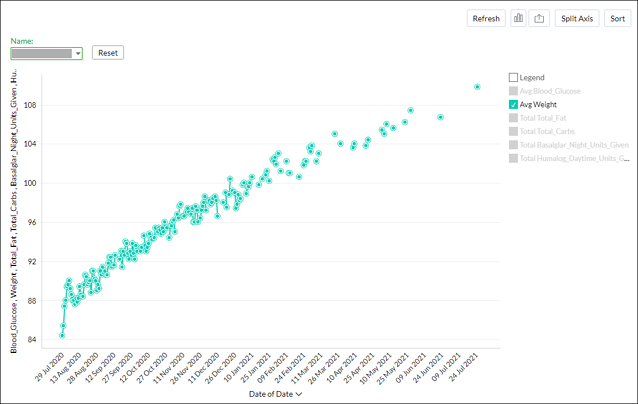
Analysis of weight and calorie data we’ve collected between late July ’20 and July ’21, a period of roughly 1 year, indicates that there is a very strong positive association (correlation = +0.74) between the number of calories consumed in a given time period, and weight in subsequent time periods. See Understanding Correlation Coefficients linked below to better understand what this number means. Bottom line, it would appear that the more calories one consumes, the more one’s weight generally increases. The reverse also appears to be true.
Attempting to Put on Pounds:
One of the first analyses the DDL team attempted to do after one of their children was first diagnosed with Type 1 Diabetes, was diving into understanding what drives weight gain. This analysis was especially important at that time because this child had lost so much weight (roughly 20 lbs) in the weeks prior to diagnosis. We were determined to put this weight back on.
The first round of this analysis was attempted roughly two weeks post-diagnosis, once the first small semblances of data could be scraped together that could facilitate semi-meaningful analysis. When we ran the numbers, and the strength of this relationship was first quantified, everyone was very surprised by the strength of the association. While we knew that correlation calculations do not in any way define a causal relationship between two variables, with this figure being so high, it was at least an indication of an action that we could take that stood a good chance of driving the outcome that we desired. So, from that point forward, we started maximizing caloric intake.
Other Important Factors:
Given that this child’s blood glucose levels were so elevated at the time of diagnosis (300+), it was critically important for us to get those levels back under control while we tackled the goal of attempting to put weight back on this child. We suspected that the goal of weight gain could not be properly achieved without the normalization of blood glucose levels also being accomplished.
To this end, this child’s parents were diligent in following the doctor’s advice regarding administering insulin injections to bring these numbers back under control. Using data as their guide, day-time insulin was needed for only approximately one week post-diagnosis, and night time insulin for roughly 1 month. At the same time, they switched to a low carb diet almost immediately post-diagnosis, and began searching for ways to maximize caloric intake while in that space. The results speak for themselves:

The above graph shows the steady weight gain this child has achieved, over the roughly 12 month period after diagnosis. The practical application of this quantification of the relationship between weight and calories appears to have not hindered us in accomplishing the desired results. It may have even contributed to this desired outcome.
High Carbs Not Necessary:
While it is extremely difficult to prove that something is true (e.g. calories drive weight gain), it is much easier to prove that something is false. Along these lines it is interesting to note that this child’s parents had people in the medical community say to them that it is impossible to gain weight without eating at least 45g of carbs per meal. This was said to them at the time when their child was first diagnosed with Type 1 Diabetes, and it formed the basis for the dietary recommendations they were making. This assertion can be rewritten as a formal hypothesis that we can test in light of the data and results obtained to date:
Hypothesis: It is not possible to gain weight without eating at least 45g of carbs per meal.
DDL Research Results: Hypothesis Rejected
Over the course of most of the time period illustrated in the above graph, this child was consuming at most 10 carbs per meal and, on average, between 2000 to 2700 calories per day. Despite consuming a very low carb diet, this child has shown steady weight gain throughout the study period. This trend continues to this day, and this child now maintains a very normal and healthy weight for their age. Hypothesis rejected.
Checking with the Doctor:
Speaking with this child’s endocrinologist roughly 6 months post-diagnosis, they were amazed and very impressed at the speed with which this child regained their weight. Apparently, it is often quite difficult for newly diagnosed Type1 Diabetics to gain their former weight back. We seemed to have solved that problem. Again, while carbs are a convenient and calorie dense fuel source for the human body, calorie consumption – much more than carbohydrate consumption – appears to have a stronger relationship to weight gain.
Relevant Links
- Welcome to Delta Data Lab!
- Quick Start: The Guide To Optimizing Type 1 Diabetes Management That We Wish We Had At Diagnosis
- Analysis: Keto and Eating Enough Calories – Calculating Your Caloric Needs (coming soon)
- Understanding Correlation Coefficients (YouTube)
